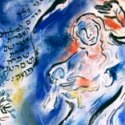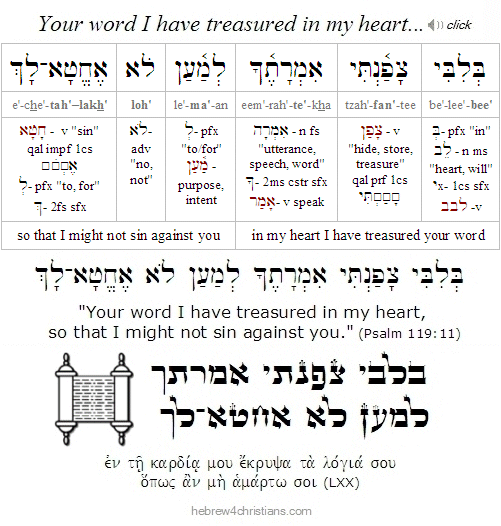|
Recently someone asked me a question about Hebrew gematria. For those of you unacquainted with the subject, gematria is an esoteric method of finding relationships between words (and phrases) in the Hebrew text. The basic idea is that since Hebrew letters can be viewed as numbers (Aleph=1, Bet=2, and so on), and since words are obviously formed from the combination of these letters, each Hebrew word can be thought of as a number, and therefore (here's the inferential step) words that share the same numerical value are somehow related.
Here's an example of how gematria works. In this week's Torah reading (Shemot), recall how the Hebrew midwives disobeyed the Pharaoh's evil decree to murder any Israelite boys they helped deliver. When the Pharaoh later asked them why they continued to let the Israelite boys be born, the midwives replied, "because the Hebrew women are not like the Egyptian women, for they are vigorous and give birth before the midwife comes to them" (Exod. 1:19). In the Torah, the phrase "before the midwife comes to them" contains a textual oddity: the word אֲלֵהֶן ("to them") is usually spelled אלהין, and the Talmud (Sotah 11b) suggests that the missing Yod in this word indicates that God Himself functioned as a Midwife to the Israelite women. How do they reach this conclusion? Well first of all Yod represents the Divine Presence (recall how this letter was added to Abram and Sarai's names, among others). Next, using gematria, the value of אֲלֵהֶן is discovered to equal 86 (1+30+5+50) -- the same value as the word אלהים, the word Elohim (God). Now the Hebrew Name Elohim is traditionally thought to represent God in His attribute of justice, and the sages surmised that God directly intervened (as a Midwife) to save the Hebrew babies from the unjust decree of Pharaoh. One implication of this interpretation, by the way, is that the midwives did not, in fact, lie to the Pharaoh. Though they detested his evil policies, they told the truth when they said that that the Israelite women gave birth before they came to them. What they didn't mention, and of course would have made no difference to the wicked Pharaoh, was that God Himself - Elohim - was intervening in this situation as the Creator and Judge of all the earth to deliver the baby boys. Ultimately, of course, this Pharaoh would come to realize this, but not before first experiencing the strong arm of God expressed in the ten plagues upon Egypt. The last and final plague (i.e., makkat bechorot, the death of the firstborn), you will recall, was divine recompense delivered in response the attempted genocide of the Jewish people....
So what are we to make of gematria as a method of interpretation? Well first it needs to be stressed that it must always cohere with the p'shat (plain reading) of Scripture. In other words, gematria cannot stand alone as an interpretative method. For instance, you will never find in valid gematria some sort of "code" that suggests that there is more than one God, that the ark of the covenant was a radio transmitter, that the Israelites came from another planet, etc. In the example cited from this week's Torah reading, we see that the use of gematria passes this test: it indeed coheres with the truth that God is the righteous Judge who would deliver the Israelites from genocide and slavery... The idea that God was the Midwife of the Israelites -- particularly as it relates to the context of the story of the birth of Moses -- likewise agrees with the greater narrative found in the Book of Exodus.
Second, while it is indeed interesting (and sometimes even enlightening) to consider non-linear ways of reading the texts, gematria can never be used as a substitute for the study of the Scriptures in their historical (and literary) context. In Jewish tradition, gematria is considered as a "spice" or additional "seasoning" to the regular study of Torah. The Jewish sages were well aware that heresy often came from those who read the Scriptures out of context... This is part of the reason that the Jewish scholar Rashi -- who stayed close to the text and did not wander off into speculation -- is highly regarded in Jewish tradition.
The best approach is to read the Torah and study the texts in a traditional manner. Check Mishnah/Talmud and other commentaries if you are puzzled. Be sure to read related passages in the New Testament as well, especially those that feature the words of Yeshua our Mashiach. Only after you are clear about the grammatical-historical meaning of a passage should (tentative) exploration be made into other ways of reading the texts. Above all, we must call upon the LORD and ask Him for ruach ha-kodesh to give us His enlightenment. If you ask the Father for bread, He won't give you a stone (Matt. 7:8-11).
Hebrew Lesson
Psalm 119:11 reading (click):
|



